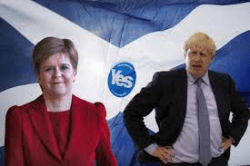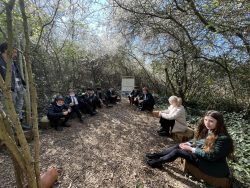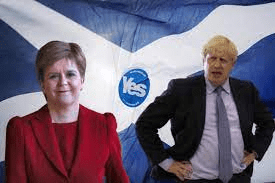Scottish Independence: A Series of Hurdles
Scottish independence and a second referendum: a series of hurdles. Year 12 Politics have been studying devolution in the UK and its potential impact on the constitution, leading...
Filter by Category
Filter by Author









































































































































































Scottish independence and a second referendum: a series of hurdles. Year 12 Politics have been studying devolution in the UK and its potential impact on the constitution, leading...
Posted by Giles Monks

Forest School – Learning Support: We are so lucky that our Year 7s and 8s are able to visit the Forest School at Little Reddings each week for some outdoor therapy, exercise...
Posted by Roa Dillon

Did someone say we’re about to experience a HEAT WAVE?!! Why not cool yourself down with a few WATER BOMBS!!! That’s right, this week’s STEM Challenge involves...
Posted by Suresh Varsani

Richard III is a historical play written in approximately 1592. It depicts the rise to power and short reign of Richard III of England. Set after the Civil War, Richard III is...
Posted by Natalie Stanton

21/4/21 Nathan Marriott 12 Oak Nathan has settled back into Sixth Form very well. Nathan is one of the Senior Head Librarians and he has been very helpful in the LRC assisting...
Posted by Des Timotheou

At Bushey Meads we are always looking at new innovative ways to ensure that our upcoming SEND students feel happy and settled upon entering the school in September. This year I...
Posted by Roa Dillon

This week I was delighted to be able to catch up with Year 7 Maple. I felt it was important to touch base to hear the views of the Year 7 students journey so far at Bushey Meads....
Posted by Nicky Hughes

As part of Flair week, students in Mrs Paddick’s year 8,9 and 10 French classes were set a challenge to complete over the Easter holidays. They rose to the challenge and...
Posted by Nicola Paddick

As part of my Food Science and Nutrition Course I was asked to complete an online course which was in Level 2 Food Safety and Preparation. The course consisted of 9 modules, each...
Posted by Alison Hanbury

Posted by Danielle Bowe
Scottish independence and a second referendum: a series of hurdles.
Year 12 Politics have been studying devolution in the UK and its potential impact on the constitution, leading to calls for independence in Scotland. Students considered how the upcoming May elections in Scotland may present a new crisis for the UK.
Mr Monks
 It’s been 6 years since the 2014 Scottish independence referendum lost to a close 55% ‘Remain’ vote. As the elections to Holyrood on the 6th May 2021 draws nearer, all eyes seem to be on Nicola Sturgeon and Boris Johnson as the two clash over the possibility of a second referendum regarding Scottish independence from the United Kingdom. The First Minister has promised that should she return with a majority of MSPs in the Scottish Parliament she will call for a second referendum and hopes to begin the process of Scottish independence from the UK amidst a wave of nationalism spurred on by the Covid-19 pandemic, as a poll from Panelbase shows 60% of those who were asked supported Scottish independence. Unfortunately for Sturgeon, achieving independence will not be that simple as she will be facing a series of hurdles.
It’s been 6 years since the 2014 Scottish independence referendum lost to a close 55% ‘Remain’ vote. As the elections to Holyrood on the 6th May 2021 draws nearer, all eyes seem to be on Nicola Sturgeon and Boris Johnson as the two clash over the possibility of a second referendum regarding Scottish independence from the United Kingdom. The First Minister has promised that should she return with a majority of MSPs in the Scottish Parliament she will call for a second referendum and hopes to begin the process of Scottish independence from the UK amidst a wave of nationalism spurred on by the Covid-19 pandemic, as a poll from Panelbase shows 60% of those who were asked supported Scottish independence. Unfortunately for Sturgeon, achieving independence will not be that simple as she will be facing a series of hurdles.
Her first hurdle will be Boris Johnson.
 Boris Johnson has not been entirely covert in his displeasure for devolution. He stated in a virtual meeting with Conservative MPs that he thought Scottish devolution was a “disaster”. He has also been quoted on the campaign trail in 2019 as seeing “no reason” to permit a second referendum to take place. It seems that his main issue is the closeness in time between the two referendums; it should be a generational event not an often repeated one. This creates a serious problem for Sturgeon and her dreams of an independent Scotland, without the Prime Minister’s approval, no legislation enabling a referendum can take place – leaving Sturgeon’s attempts to realise Scottish independence stumped.
Boris Johnson has not been entirely covert in his displeasure for devolution. He stated in a virtual meeting with Conservative MPs that he thought Scottish devolution was a “disaster”. He has also been quoted on the campaign trail in 2019 as seeing “no reason” to permit a second referendum to take place. It seems that his main issue is the closeness in time between the two referendums; it should be a generational event not an often repeated one. This creates a serious problem for Sturgeon and her dreams of an independent Scotland, without the Prime Minister’s approval, no legislation enabling a referendum can take place – leaving Sturgeon’s attempts to realise Scottish independence stumped.
Her second hurdle will be the Constitutional Crisis that ensues.
 Should Boris decline Sturgeon’s requests, a Constitutional Crisis will emerge, with the question being whether the Prime Minister can deny the request for a referendum. This question could grip British politics for months to come and dominate the Commons in a similar manner to Brexit. The Government will argue that they have not devolved this power of referendum to Scotland as Westminster Parliament is Sovereign – only they can authorise referendums in the UK. But the SNP (potentially in alliance with Labour) will fight tooth and nail to deny this and argue that the will of the Scottish people should be enough for a referendum. Boris, if left with no other choice, can use his majority in Parliament to answer this question through Statute, but this will take time. Should the SNP lose this crisis Sturgeon will have to wait for a Prime Minister willing to seek Parliamentary approval for a second referendum. However, Sturgeon would still have one alternative left, to push on without a Westminster Parliamentary sanctioned referendum. Then a new crisis will arise asking if the ability to call a referendum is a reserved Constitutional power or not.
Should Boris decline Sturgeon’s requests, a Constitutional Crisis will emerge, with the question being whether the Prime Minister can deny the request for a referendum. This question could grip British politics for months to come and dominate the Commons in a similar manner to Brexit. The Government will argue that they have not devolved this power of referendum to Scotland as Westminster Parliament is Sovereign – only they can authorise referendums in the UK. But the SNP (potentially in alliance with Labour) will fight tooth and nail to deny this and argue that the will of the Scottish people should be enough for a referendum. Boris, if left with no other choice, can use his majority in Parliament to answer this question through Statute, but this will take time. Should the SNP lose this crisis Sturgeon will have to wait for a Prime Minister willing to seek Parliamentary approval for a second referendum. However, Sturgeon would still have one alternative left, to push on without a Westminster Parliamentary sanctioned referendum. Then a new crisis will arise asking if the ability to call a referendum is a reserved Constitutional power or not.
And her final hurdle will be the transition of power.
Even if successful, Sturgeon faces another final hurdle which is managing the transition of power should everything go her way and she is allowed and wins a referendum. As we saw with Brexit, it took nearly 4 years from the referendum to achieve ‘independence from the EU’ and with this internal referendum, it may take even longer. To create a truly independent Scotland the SNP will need to perform a variety of tasks: creating new institutions to replace British ones, forming a new Constitution, Head of State and diplomatic ties with important trade partners to name a few. All of this will take time as bureaucracies will have to be navigated and Bills will need to be passed. Furthermore, the SNP will need to fix the current deficit Scotland is facing, and replace the funding Scotland receives from the rest of the UK taxpayers to ensure a stable economic future for Scotland.
As the treacherous seas of political discourse await Sturgeon and the SNP, Scottish independence seems both nearer to realisation and potentially far away. Hope for the SNP is not lost however, according to polls, across the UK support for Scottish independence has never been higher and with a mandate from the Scottish electorate, it will be harder for Boris to deny Nicola Sturgeon’s request without facing serious consequences.
All we can do is wait for the process to begin on the 6th May, where the future of Scotland and the United Kingdom may well be significantly altered as a consequence.
Adam Fishman 12Ash

Olivia R 12W Olivia has been nominated by Mrs Speker for her incredibly hard work and commitment in Art. She always throws herself into tasks and seeks to achieve her best. These...

Year 12 students find out about Apprenticeships within a Scientific and Engineering environment at global healthcare company GlaxoSmithkline. We were delighted to accept the offer...